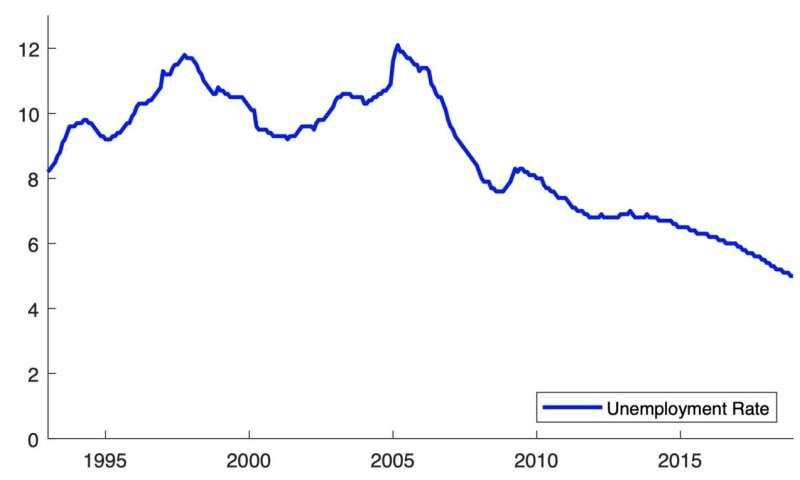Study reveals that reforms to the Federal Employment Agency had unexpected effects

The Hartz reforms from 2003 to 2005 are considered an important reason for the relatively good development of the labor market in Germany. The reforms also included restructuring the Federal Employment Agency (Bundesagentur für Arbeit (BA)) in 2004. A study carried out at FAU has now come to a remarkable conclusion with regards to the effectiveness of the reforms: The new structure of the Federal Employment Agency has not improved the Agency's ability to match vacant positions with job seekers.
Rather, an improved activation policy at the Agency increased the use of private job search engines by job seekers, thus increasing the likelihood that they find a new job.
Restructuring of Federal Employment Agency investigated
In his analysis, Prof. Dr. Christian Merkl, Chair of Macroeconomics at FAU, comes to the conclusion that the restructuring of the Federal Employment Agency in 2004 did decrease aggregated unemployment in Germany by nearly one percentage point, but in a different way than expected.
In conjunction with Timo Sauerbier, research associate at the Chair of Macroeconomics, Merkl demonstrates that the proportion of jobs found via the Federal Employment Agency was actually lower after the reforms than before the reforms (eight percent instead of eleven percent).
"The decrease in the proportion of jobs matched by the Agency was accompanied by a decrease in the number of unemployed and an increase in the number of vacancies reported to the Agency, which when seen in the context of our quantitative model suggests that the Agency's performance has improved, but not in the way we had expected," says Prof. Dr. Christian Merkl.
More matches via private job searches
Instead, the restructured Federal Employment Agency has led to improvements in activation policy and thus ultimately to more matches via the private recruitment market (job portals, job adverts in newspapers, etc.) observes FAU researcher Merkl. "In the new structure, each job seeker was assigned to a specific caseworker at the Agency and, at the same time, the number of cases for each caseworker was reduced."
"Firstly, this meant the improved individual support that caseworkers were able to provide to each job seeker enabled job seekers to use the private job search market more effectively, which lowered the individual costs for private job searches. Secondly, caseworkers received more means of exerting pressure on job seekers via sanctions, which increased individual costs if no searches were performed on the private job market."
Important lesson for other European countries
In fact, descriptive data show considerable use of sanctions after the Hartz III reforms and, at the same time, a considerable increase in searches on the private recruitment market. Both more support and increased sanctions for job seekers corresponded with the new strategy of the Federal Employment Agency as part of the Hartz reforms ("challenge and support").
"We are able to demonstrate that the restructured Federal Employment Agency contributed to exerting pressure on job seekers to use the private job search market more actively, instead of improving how it matched job seekers with vacancies directly. Since caseworkers knew their clients better in the newly structured organization, they were able to support and challenge them better," explains Prof. Dr. Christian Merkl.
Closing a gap in research
With his study, Prof. Dr. Christian Merkl has closed a gap in research that had existed to date. While the macroeconomic effects of the 2005 unemployment benefit reform have received a great deal of attention in academic practice, little attention has been paid to the macroeconomic labor market effects of the restructuring of the Federal Employment Agency in 2004.
FAU researchers have done so on the basis of data previously unused at this scale from the Socio-Economic Panel (SOEP), the largest and longest-running multidisciplinary long-term study in Germany, and the IAB Job Survey.
Prof. Dr. Christian Merkl is able to come to a decisive conclusion: "This is an important lesson for other European countries that often have similar public employment agencies. The German example does not show how public job search activities can be improved. Instead, it makes it clear how a public employment agency has to be restructured so that the number of private job searches increases and overall unemployment levels decrease as a result."
More information:
The study is available online at VoxEU: cepr.org/voxeu/columns/reorgan … abour-market-upswing
Provided by Friedrich–Alexander University Erlangen–Nurnberg